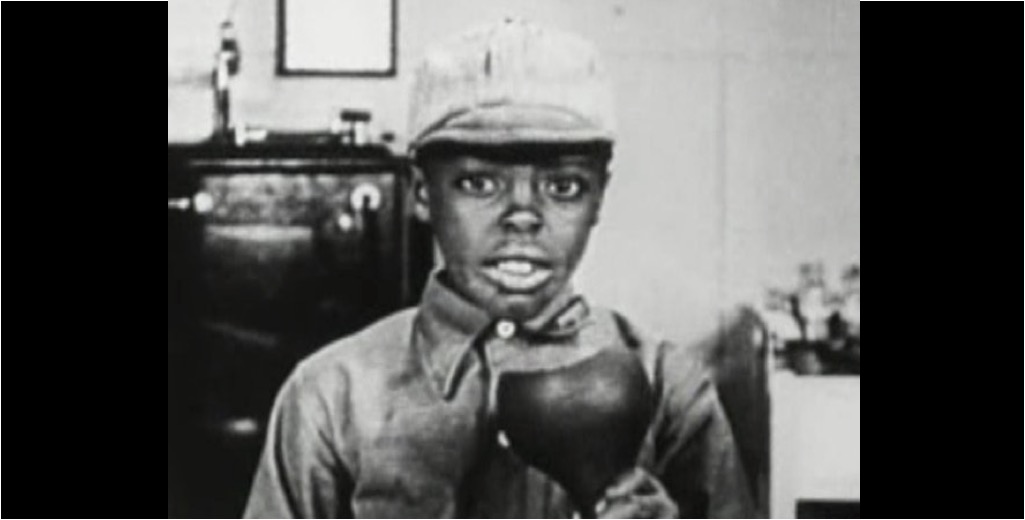On this day in comedy on December 20, 1912 Comedian, Actor, Dancer, Band Leader, Ernest Fredric “Ernie” Morrison (“Sunshine Sammy”) was born in New Orleans, Louisiana.
Sunshine Sammy got his stage name by behaving. When a film crew member persuaded young Morrison’s father to bring in the newborn for a shoot, the infant defied expectations as well as trepidations and did not cry. He was a professional right out of the womb. The film crew dubbed him “Sunshine” for making it such a cheerful day and Morrison’s father threw in the “Sammy” part. Oh he would be given other names later on, like “Little Sambo” and “Smiling Sambo”, but for his maiden voyage, “Sunshine Sammy” was what Morrison responded to when summoned.
With his early reputation established, Sammy became a popular and in demand child actor. He worked opposite silent screen favorites, Harold Lloyd and Snub Pollard. From there he was signed to a long term studio contract. Sammy was the first black actor to be signed to such an agreement (child or adult) when he put his John Hancock on the dotted line for mega-producer,
Hal Roach in 1919. Roach’s first project for Sammy was a series of shorts about a little black boy (surely to be an acting stretch), but the distributors wanted nothing to do with it. Only one shot episode was ever shown to the public. This left Roach with the dilemma of what to do with his young talent.
One day Roach was casting for his Our Gang series about a group of kids and their antics. He’d tired of auditioning grown-up acting child thespians and took a moment to look out of his office window. Across the street in a parking lot were regular kids playing in a regular, realistic manner. They were of different races and sizes and Roach had a brainstorm. He’d rewrite his cutesy project to be more down-to-Earth and cast Sunshine Sammy in this retooled version of the proposed Our Gang.
Sunshine Sammy was featured in the Our Gang series from 1922-1924. He set the template of those other black cast members (Alan Hoskins as ‘Farina’, Matthew Beard as ‘Stymie’ and William Thomas as ‘Buckwheat’) to follow since most shorts with children were not as innovative as Our Gang when it came to racial harmony. Instead of Sammy being picked on and the butt of the majority of jokes, he was just one of the kids having the same fun and bouts of trouble, regardless of his race. Even when an occasional insensitive Caucasian writer would attempt to inject some racial jibes, Roach would shut it down for the most part and insist that Sammy (his protégé) was just one of the gang.
In 1924 Sammy left the Our Gang cast and went to work on vaudeville. He appeared in shows that also featured up & comers Abbott & Costello and that hot young comic of the day, Jack Benny. Sammy had a partner now, Sleepy Williams and they toured Australia. When they got back from their successful run, Sammy was plucked up by producer, Sam Katzman to be an East Side Kid. This would be another first for Sammy. He was the first black kid in the Our Gang fledgling series. This time he would be the first and only black cast member of the East Side Kids, an established and popular series of the time. Sammy played the part of “Scruno” and went all Stanislavski on them by drawing on his early experiences as a New York kid from the East Side. He was a hit.
Sammy stayed with the East Side Kids for three years. He left when he was offered a chance to perform with the Step Brothers. They were a black film and dance act and Sammy wanted in. He got his groove back right before he was drafted into the Army during World War II. When he returned he was still in demand, but not for the kind of work he wanted. He was approached to do The Bowery Boys, another series of shorts devoted to getting laughs from the shenanigans of young boys raised on the wrong side of the tracks. Once again Sammy would be the only black, but this time he declined. He said he didn’t like the set up. Perhaps too much cooning was in the works.
Uncharacteristic for entertainers of his era, Morrison made a good amount of money in show business and apparently kept most of it. There were never any stories of financial hardships and in his later years he quit the glamour biz and went to work at an aircraft plant developing missiles. He occasionally would dip his toe back into the world of make believe, like in the 1970s when he appeared on the CBS hit sitcom, Good Times. However, he didn’t make a full return to work before the cameras and after scores of projects, Morrison died of cancer in Lynwood, California on July 24, 1989.
Take a look at this hilarious clip of Sammy at work:
By Darryl “D’Militant” Littleton
www.darryllittleton.lol


